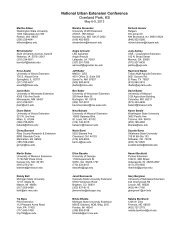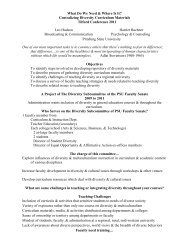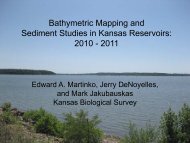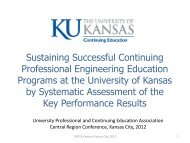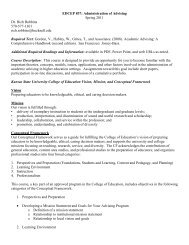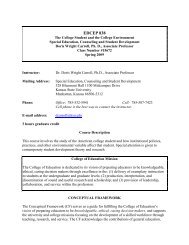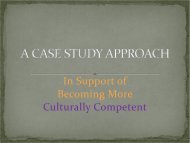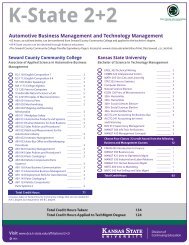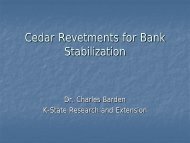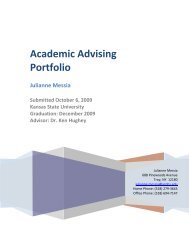David Freitag – KSU Capstone Project - K-State Division of ...
David Freitag – KSU Capstone Project - K-State Division of ...
David Freitag – KSU Capstone Project - K-State Division of ...
Create successful ePaper yourself
Turn your PDF publications into a flip-book with our unique Google optimized e-Paper software.
The relational component includes the one-‐to-‐one relationship and trust between<br />
advisor and advisee which is critical to the advising process and to the student’s<br />
satisfaction with the advising session and the institution. Without productive one-‐on-‐one<br />
relationships with students, building a level <strong>of</strong> mutual trust, I will not be able to effectively<br />
address my students’ developmental needs.<br />
A thorough understanding <strong>of</strong> the conceptual component will enable me to increase<br />
the effectiveness <strong>of</strong> my advising sessions. A commitment to lifelong learning is essential in<br />
improving my conceptual knowledge <strong>of</strong> the pr<strong>of</strong>ession <strong>of</strong> academic advising and my<br />
knowledge <strong>of</strong> the theories <strong>of</strong> student development and career development. Although there<br />
are no recognized unifying theories <strong>of</strong> academic advising, knowledge <strong>of</strong> theories relevant to<br />
academic advising are still useful because they reduce a complicated interpersonal<br />
situation to an understandable number <strong>of</strong> elements (Creamer, 2000).<br />
Bringing the three components <strong>of</strong> academic advising together, after the basic<br />
informational needs <strong>of</strong> students are met, I help students understand the relationship<br />
between their university course work, their intended career, and their desired lifestyle. I<br />
challenge students’ unrealistic or unreasonable beliefs. I encourage students to exercise<br />
their problem-‐solving and decision-‐making skills to advance their level <strong>of</strong> personal<br />
development. I encourage students to turn their talents into strengths and use those<br />
strengths to achieve their personal and career goals (Schreiner, 2005). Through my<br />
knowledge and understanding <strong>of</strong> the framework <strong>of</strong> the three components <strong>of</strong> academic<br />
advising, I help students realize their educational plans and dreams. It is my passion to help<br />
each student, through their education, to become the person they want to be.<br />
7



